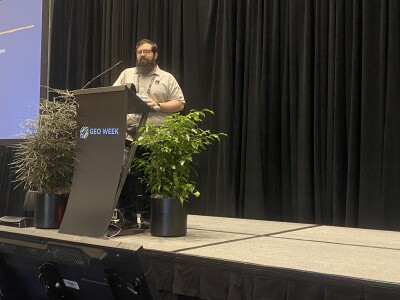This week my landlord began making various improvements to the property where my office is located in Franklin, TN (in the Nashville area). By Friday, most things had been repainted and he had a crew installing a new rubber membrane on the roof of the building that adjoins ours. It being Friday, I suppose, one of the workers became a bit overzealous with the blowtorch and melted a few wires on the HVAC unit atop the building. Their insulation now dripping away, the wires started a fire that caught part of the roof and required a visit from the fire department. The fire was put out and the damage (excepting the HVAC unit) was minimal. However, it did take until Saturday morning to get the roof cleared for repair work to begin, during which we received nearly 3 in (7.6 cm) of rain. This is not good when you have a gaping hole in your roof.
All of this happening literally 20 feet from my office door put me in a bit of a panic. Equipment and furnishings aside, there is no doubt in my mind that losing all of the data stored in my office would be a tremendous setback. I have written before about data archiving, and I have copies of my data at other offices in case of just such an event. However, I would still have to acquire new computers, and copy all of the data again—my initial estimate is that I would lose about three weeks of productivity. However, what really worried me was the project that I was going to present to a client Monday morning, as it was still processing when I left Friday night. My plan had been to finalize it over the weekend and then back it up after the presentation. Suddenly I felt very nervous about an archiving plan that I had always held up as an example.
I don’t know why I had never noticed this before, but all of my efforts to archive data had been focused on preserving it in case the client called back, or in case we might be able to reuse the data. I’ve now been at this for over a decade and I can only think of two instances where a client called back about a project more than six months after it was completed. To make things worse, neither time involved new billable work! The clients were happy that I had the data, but when you think about it, that’s a lot of time and money for zero return. This is true especially when you consider that I have archive hard drives that will soon contain data amounts in the hundreds of terabytes.
Over the years my system has morphed from workstation/firewire drives, to workstation/server, to workstation/server/tape backup, to workstation/server/hard drive archive. You’ll notice that the thing that has always been missing is the one you hear recommended the most: “put it in the cloud!” This was always missing from my system due to the size of my data. However, it now occurs to me that the time may be right to incorporate some level of cloud backup.
I’m considering moving active projects to a single hard drive on my workstation and then having that drive (and that drive only) perform an automatic backup overnight to some cloud service. With certain projects (mobile LiDAR, multiple crews, etc.), I may not be able to complete the backup overnight, but even if it is only done weekly I should be able to mitigate some damage.
As for the traditional archiving that I’ve always done, well, I’m not so sure anymore. Memory has never been cheaper, but the real cost is in keeping the data accessible. Every time you upgrade your software or change software platforms, you have to go through all of the data in your archives. This is incredibly time consuming. The only formats that have held their interoperability across multiple platforms thus far are the most bloated in terms of storage space (PTS, TXT, etc.). I’ve been caught more than once trying to look at old data (typically for marketing or training purposes) only to realize that the current version of Cyclone can’t read it because the data is too old. Fortunately, Leica has always been able to help with providing whatever version of Cyclone 6.x that can both read my 5.5 data and be read by 8.1, but that’s just more work on everyone’s part.
I’d love to hear the range of opinions on the matter from all of you. Do you actively maintain every project you’ve ever done in an accessible state? Do you use an automated backup for active projects? I think I’m about to do the latter and I’m seriously considering forgetting about the really old stuff.
BTW, I just realized that last week marked my 100th post! I wanted to thank everyone that has aided in providing this forum for my thoughts – from Tom Greaves who first asked me to do it, to Sam Pfiefle who was a great help in establishing a voice and Lisa Murray who has been very supportive each and every week. Lastly, I must thank all of you that take the time to read and comment. If you weren’t here I would have been gone a long time ago!





